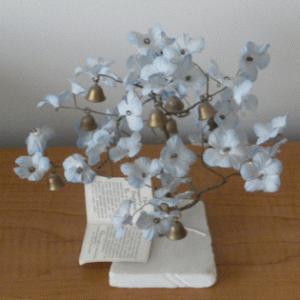 On top of my bookshelf I keep a Prosperity Tree, which is by far the most ridiculous gimmicky item I own. It’s about the same height and width as my open hand and has pale blue silk flowers, a white marble base, and a brass trunk and branches with tiny bells at the ends. According to the tag attached at the base, the tree is supposed to bring good fortune, in whatever form of prosperity one desires, when the bells are rung.
On top of my bookshelf I keep a Prosperity Tree, which is by far the most ridiculous gimmicky item I own. It’s about the same height and width as my open hand and has pale blue silk flowers, a white marble base, and a brass trunk and branches with tiny bells at the ends. According to the tag attached at the base, the tree is supposed to bring good fortune, in whatever form of prosperity one desires, when the bells are rung.
In what I thought was an amusing bit of irony, I acquired it in a Yankee Swap at a Christmas party several years ago, after its fantastic powers evidently had failed to make much of an impression on its former owner. My contribution to the swap, if I recall correctly, was a gift basket someone had sent me with fruitcake and other stuff I wasn’t interested in eating. When I came away with the little tree, it seemed a fair enough trade.
Every now and again I pick up the Prosperity Tree and shake it to ring the bells. Not because I’m superstitious enough to imagine that I’ll win the lottery, which I don’t play anyway, or that some other miraculous good fortune will suddenly show up on my front porch. But I do think it’s worthwhile in today’s hectic society to pause for a moment and reflect on what a prosperous life might mean.
Once upon a time, our ancestors had a much slower-paced existence governed by the natural rhythms of the days and seasons. Finding enough food to keep the tribe alive was often a struggle; but they still had time to dance, to create art and music, and to consider their relationship to the world around them through their myths and rituals. Prosperity would have been a very simple concept in those days and would have meant no more than having a good hunt or discovering a patch of tasty berries. It might have been commemorated by a cave painting, a dance in the moonlight, or a ceremony honoring the tribe’s gods for their benevolence in creating such a wonderful world for the people to enjoy.
A couple of weeks ago, along with the usual advertising fliers and utility bills, I got my quarterly 401(k) account statement in the mail. Stocks had gone up since the last statement, as illustrated by a rising bar graph on the first page. Some of the news articles I’d been browsing reported that the economy could be recovering from last year’s doldrums. I tossed the statement into a pile of stuff to be put away later in my file drawer while briefly contemplating the possibility that in another twenty years or so, I might have enough money for whatever our culture has decided is a prosperous retirement, assuming that future corporate and political leaders haven’t found new ways to wreck the economy (not to mention random computer screwups of the sort that occurred last week). These thoughts did not leave me feeling inspired to paint a mural of the New York Stock Exchange on a wall of my suburban cave.
There’s no doubt modern humans enjoy far more material comforts than our tribal ancestors ever could have imagined in their wildest dreams. But the ways in which we acquire them have become too abstract for us to comprehend, too far removed from anything that we evolved to recognize as cause for joy and celebration. It is no coincidence that we have such high levels of depression, anxiety, and related conditions, even as our lifespan and standard of living far surpass those of past generations. We no longer feel confident that we know our place in the world.
Gwen McKay on 05/12/10 in Art/Play/Myth, featured | No Comments | Read More

